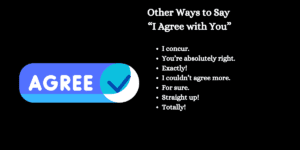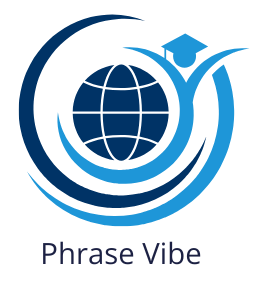Finding Unique Ways to Show Agreement
In English, there are many phrases to express agreement with someone’s perspective or opinion. Saying “I agree” is simple, but using alternative phrases can feel more nuanced and engaging. Whether discussing a subject like work or planning a weekend, agreement often indicates a shared understanding that builds better connections.
For example, instead of simply saying “I agree,” you could try “That’s a good idea” or “I’m on board with that.” These alternatives help create more varied ways to express alignment and can be especially useful when suggesting a solution to a problem or sharing common ground.

List Of Other Ways to Say “I Agree with You”
- I concur.
- You’re absolutely right.
- Exactly!
- I couldn’t agree more.
- For sure.
- Straight up!
- Totally!
- That makes sense.
- No doubt about it.
- I see what you mean.
- We’re eye to eye on this.
- I fully endorse that.
- I share your view.
- I’m in support of this.
- We’re in accord.
- I second that.
- We share the same view.
- I’m of the same opinion.
- I feel the same way.
- Absolutely right.
- I couldn’t agree more.
- That makes sense.
- I’m on board with that.
- We see eye to eye.
- That’s a valid point.
- I fully support this.
- I agree with your perspective.
- I echo your sentiments.
- I endorse this position.
- We are in accord.
- Our views are aligned.
- I agree with your assessment.
- I’m in sync with your thoughts.
- This argument resonates with me.
- I support this proposal.
- Your viewpoint makes sense.
- I affirm your conclusion.
- That’s a persuasive argument.
- I’m in complete agreement.
- I’m in favor of this approach.
- I appreciate your insight.
You Might Like To Read Creative Ways to Say “I’ll Keep you Posted
I Concur
Explanation: I concur is a formal synonym for agree, often used in professional or academic settings. It shows alignment with someone’s opinion, statement, or assessment in a thoughtful way.
Example: “After reviewing the analysis, I concur with your opinion on rescheduling the project timeline. Your assessment of the situation seems accurate.”
Where to Use: Use I concur in meetings, during discussions about potential solutions, or when agreeing with a formal statement in academic or professional settings.
You’re Absolutely Right
Explanation: Saying “You’re absolutely right” is a strong way to acknowledge that a statement or point is valid and without limitation. It’s often used to clearly express agreement in conversations.
Example: “Your analysis of the issue is absolutely right. It’s a valid point that will help us make a productive decision as a team.”
Where to Use: Use this phrase during team discussions or in one-on-one conversations to show support for someone’s correct impression or idea.
Exactly!
Explanation: The phrase “Exactly!” is a quick and effective way to confirm and agree with someone’s feelings or statement. It’s often used casually to emphasize alignment or understanding.
Example: “That’s exactly what I was thinking! Your definition perfectly matches my idea.”
Where to Use: Use this in both casual and professional settings, such as during class discussions with teachers and students or informal conversations to show enthusiastic agreement.
I Couldn’t Agree More
Explanation: The phrase “I couldn’t agree more” emphasizes strong, full agreement without any reservations. It’s a polite and enthusiastic way to express complete support.
Example: “Your proposal to have Fridays at home is excellent. I couldn’t agree more; it will boost morale for employees.”
Where to Use: Use this in meetings to show enthusiastic support for a suggestion or during informal settings with students or employees to encourage positive discussions.
For Sure
Explanation: “For sure” is a casual and shortened phrase to express absolute agreement or certainty. It’s often used in informal conversations as a friendly way to say “definitely” or “exactly”.
Example: “That pizza is delicious, for sure. I couldn’t agree more with your choice!”
Where to Use: Use this slang in informal settings, such as chatting with friends, colleagues, or during relaxed discussions to keep the tone light and approachable.
Straight Up!
Explanation: “Straight up!” is a casual expression used to show honest and straightforward agreement without hesitation or reservations. It conveys sincerity in a relaxed way.
Example: “I wish Steve’s Pizza was closer. Straight up, I’d drive an hour for it!”
Where to Use: Use this phrase in casual conversations with friends or colleagues when you want to emphasize your agreement in a relatable and informal tone.
You Might Like To Read Alternative Ways to Say “Welcome Back”
Totally!
Explanation: “Totally” is a casual and synonymous expression for absolutely or definitely, often used to express enthusiastic agreement. It conveys alignment in a laid-back manner.
Example: “I’d totally consider moving closer to Steve’s Pizza. It’s that good!”
Where to Use: Use this phrase in informal settings with friends, family, or colleagues when you want to agree with excitement or relatability.
That Makes Sense
Explanation: “That makes sense” is an expression that indicates a statement or argument is logical and reasonable. It shows you agree with the speaker’s explanation.
Example: “Moving closer to the pizza shop for better work-life balance? That makes sense!“
Where to Use: Use this phrase in discussions or conversations to acknowledge and validate ideas that seem worth considering.
No Doubt About It
Explanation: “No doubt about it” is a phrase that expresses firm agreement and confidence in the speaker’s statement, leaving no room for questioning its validity.
Example: “Steve’s Pizza is worth the move—no doubt about it. It’s definitely a great decision!”
Where to Use: Use this in casual or professional conversations to affirm agreement with confidence, especially when the point is clear and undeniable.
I See What You Mean
Explanation: “I see what you mean” is a polite phrase that shows you understand the other person’s point and may also agree. It’s often followed by “but” or “however” if there’s a slight disagreement.
Example: “Yeah, I see what you mean about lowering the risk. It’s a thoughtful solution.”
Where to Use: Use this phrase with a partner, friend, or colleague to acknowledge their perspective while remaining polite and open to discussion.
We’re Eye to Eye on This
Explanation: “We’re eye to eye on this” is a common synonym for agree, used to show a strong mental connection and shared perspective on an issue or idea.
Example: “We’re eye to eye on this project timeline. It’s great to see we’re thinking the same way.”
Where to Use: Use this phrase in English discussions with a partner, brother, or colleague to emphasize a mutual understanding and alignment of opinions.
I Fully Endorse That
Explanation: “I fully endorse that” means giving complete agreement and support to an idea or suggestion. It shows strong approval and confidence in the proposal.
Example: “I fully endorse that plan. It’s a really great idea and deserves a thumbs up.”
Where to Use: Use this phrase in formal settings to express important agreement and belief in a proposal, such as during meetings or professional discussions.
I Share Your View
Explanation: “I share your view” is a polite phrase indicating that you hold the same opinion on a matter. It’s often used to show mutual understanding and support for someone’s thoughts.
Example: “I share your view that teamwork is crucial. It’s an important idea for success.”
Where to Use: Use this in team discussions or professional settings to express alignment with someone’s thoughts or ideas in a respectful way.
You Might Like To Read Unique Ways to Say “Please Disregard My Previous Email”
I’m in Support of This
Explanation: “I’m in support of this” is a polite way to show complete agreement and endorsement of an idea or proposal. It highlights your willingness to back the suggestion and help it succeed.
Example: “I’m in support of this enhanced data security plan. It’s a good idea and critical for success.”
Where to Use: Use this phrase in team discussions or professional settings to express belief in an important idea and show your favor for its implementation.
We’re in Accord
Explanation: “We’re in accord” is a fancy synonym for agree, meaning you are in harmony with someone’s views or opinions. It conveys a mature and professional way of saying you feel the same.
Example: “We’re in accord on this point of view. It’s great to be on the same page.”
Where to Use: Use this in formal or professional settings with grown-ups or colleagues to express mutual understanding and agreement on a point or decision.
I Second That
Explanation: “I second that” is a common synonym for agree, used to express support for something someone else has said or suggested. It shows you are in alignment with their opinion.
Example: “I second that idea. It’s a great way to move forward with the project.”
Where to Use: Use this phrase in team conversations or meetings to add your voice of support when agreeing with someone’s suggestion or opinion.
I Appreciate Your Insight
Explanation: “I appreciate your insight” is a way of valuing someone’s suggestions or ideas, expressing agreement, and acknowledging their contribution to improving communication.
Example: “I appreciate your insight on this project. Your suggestions will help in improving the overall approach.”
Where to Use: Use this phrase in professional or collaborative settings to express gratitude and agreement with someone’s valuable input or suggestions.
You Might Like To Read Alternative Ways to Say “Can You Repeat That?”
I’m in Favor of This Approach
Explanation: “I’m in favor of this approach” means you are supporting a particular method or strategy. It shows your alignment with the idea and indicates your agreement with it.
Example: “I’m in favor of this approach to enhancing team productivity. It seems like a solid strategy.”
Where to Use: Use this phrase in meetings or team discussions when expressing your support for a proposed strategy or method.
What Does “I Agree” Mean with You?
“I agree” is a common phrase in English used to express that you share the same perspective or opinion as another person. It indicates that you accept or acknowledge what the speaker has said and are in agreement with their viewpoint.
For example, when someone mentions a promising idea for a party or suggests where to get the best pizza, saying “I agree” shows that you believe their idea is true or helpful. In a business setting, such as advertising or spending money wisely, agreeing often leads to a consensus or team support for a decision.
